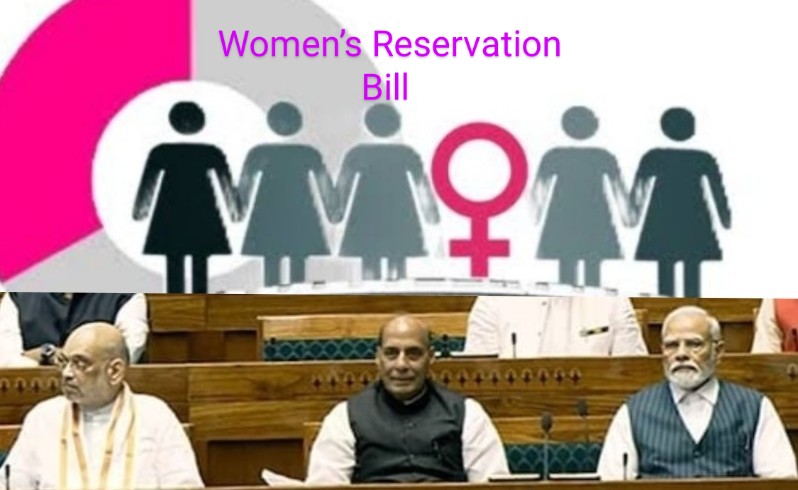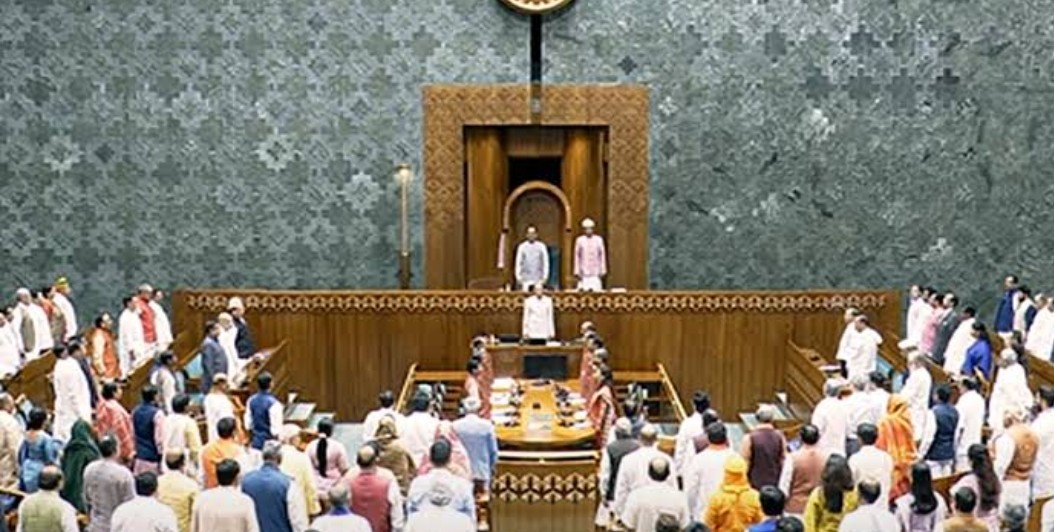Historic Passage of Women’s Reservation Bill in Lok Sabha and Rajya Sabha.:
Nari Shakti Vandan Adhiniyam' Bill
Rajya Sabha's Crucial Role
Prime Minister Modi's Praise
Overwhelming Support in Lok Sabha
Extended Voting Process
Battle Over Credit
Assurance from Home Minister
The 'Quota within Quota' Debate
BJP's OBC Representation
'Avoiding Political Reservation'
Streamlining the Process
Rajya Sabha Passes Women's Reservation Bill
Prime Minister Celebrates Historic Moment
Landmark Legislation in India's Parliamentary History
Lok Sabha Approves 33% Seats for Women
Overwhelming Majority Supports the Bill
Bill Named 'Nari Shakti Vandan Adhiniyam'
In a significant development, the Rajya Sabha has passed the Women's Reservation Bill with 215 votes. Prime Minister Narendra Modi celebrated this historic moment, describing it as a "golden moment in India's parliamentary journey." This legislation had already passed in the Lok Sabha after a lengthy 7-hour debate, ensuring 33% of seats for women in both the Lok Sabha and state legislative assemblies. Out of 454 MPs, an overwhelming majority voted in favor of the bill, with just 2 MPs opposing it. The bill has been named 'Nari Shakti Vandan Adhiniyam.' Stay tuned with TOI for the latest updates on this landmark development.
By : Sunil Kumar, Attingal
#PrimeMinisterModi #IndianParliament #
Nari Shakti Vandan Adhiniyam' Bill
On September 20, 2023, the Lok Sabha accomplished a historic milestone by approving a historic Bill that changes the Constitution to grant one-third reservation to women in both the Lok Sabha and State Assemblies. This historic Bill had been in the works for twenty-seven years. The Bill, which has garnered near-unanimous support from Lok Sabha members, marks a significant step towards enhancing women's participation in the political landscape.
Rajya Sabha's Crucial Role
The Bill's journey is not complete yet, as it will now proceed to the Rajya Sabha for approval during the remaining two days of the Special Session of Parliament. Additionally, it may require the approval of at least half of the States. This process will determine the Bill's fate and its ultimate transformation into law.
Prime Minister Modi's Praise
Prime Minister Narendra Modi, recognizing the significance of this legislation, celebrated the Lok Sabha's support for the Bill. He expressed his gratitude on X (formerly known as Twitter), thanking Members of Parliament from all political parties for their backing.
Overwhelming Support in Lok Sabha
The Constitutional requirement of securing "two-thirds majority of the members present and voting" was effortlessly met, with 454 Lok Sabha members supporting the Constitution (One Hundred and Twenty Eighth) Bill 2023. Only two members of the All India Majlis-E-Ittehadul Muslimeen, Asaduddin Owaisi and Syed Imtiyaz Jaleel, opposed the Bill.
Extended Voting Process
During the voting process, which took nearly two hours, Prime Minister Modi was present. Members cast their votes manually, employing paper slips to voice their support or opposition.
Battle Over Credit
The eight-hour-long debate witnessed a heated battle between Treasury and Opposition benches, led by the Congress, over the attribution of credit for this landmark Bill. The contentious issue of establishing a separate quota for women belonging to other backward classes (OBCs) also took center stage.
Assurance from Home Minister
The government would correct any issues moving forward, Home Minister Amit Shah informed the House. He urged members of the opposition to support the bill, stressing that reservations would be assured.
The 'Quota within Quota' Debate
The Congress, reversing its 2010 stance, called for a separate quota within the quota for OBCs, following a caste census. Sonia Gandhi, the leader of the Congress and the first speaker in the debate, insisted that there was no need to delay the Bill's implementation by linking it to a delimitation exercise frozen until 2026.
BJP's OBC Representation
Home Minister Amit Shah vigorously refuted this claim by pointing out that, in addition to having the most OBC parliamentarians overall in the political spectrum, the BJP also had Mr. Modi as its Prime Minister. He gave statistics, emphasising the fact that 85 BJP MPs, or 29% of the party's total, had OBC ancestry.
'Avoiding Political Reservation'
Minister Shah clarified that the decision to implement reservation post-delimitation aimed to ensure that a quasi-judicial body like the Delimitation Commission could, after public consultation, decide which seats to reserve. He posed a crucial question: should they risk being accused of making a "political reservation" if seats like Rahul Gandhi's Wayanad or Asaduddin Owaisi's Hyderabad were reserved?
Streamlining the Process
Law Minister Arjun Ram Meghwal emphasized that an immediate reservation provision could face legal challenges for violating constitutional provisions. He pledged not to let the Bill be bogged down by technicalities.
During the extensive Lok Sabha debate, involving 60 members, 27 of whom were women MPs, the long voting process unfolded. Electronic voting was not an option due to certain political parties' failure to inform the Lok Sabha secretariat about division numbers and specific seat allocations.
In conclusion, the passage of the women's reservation Bill in the Lok Sabha marks a historic moment in Indian politics, signaling progress towards gender equality and women's empowerment in the political sphere.
Rajya Sabha Passes Women's Reservation Bill
Prime Minister Celebrates Historic Moment
Landmark Legislation in India's Parliamentary History
Lok Sabha Approves 33% Seats for Women
Overwhelming Majority Supports the Bill
Bill Named 'Nari Shakti Vandan Adhiniyam'
In a significant development, the Rajya Sabha has passed the Women's Reservation Bill with 215 votes. Prime Minister Narendra Modi celebrated this historic moment, describing it as a "golden moment in India's parliamentary journey." This legislation had already passed in the Lok Sabha after a lengthy 7-hour debate, ensuring 33% of seats for women in both the Lok Sabha and state legislative assemblies. Out of 454 MPs, an overwhelming majority voted in favor of the bill, with just 2 MPs opposing it. The bill has been named 'Nari Shakti Vandan Adhiniyam.' Stay tuned with TOI for the latest updates on this landmark development.
By : Sunil Kumar, Attingal


























